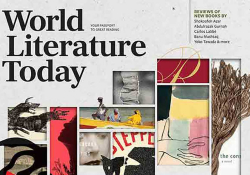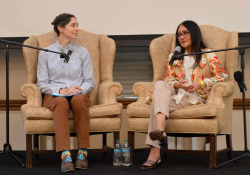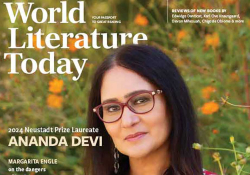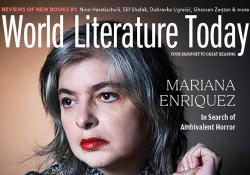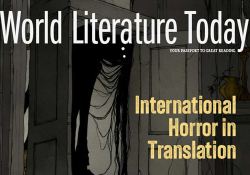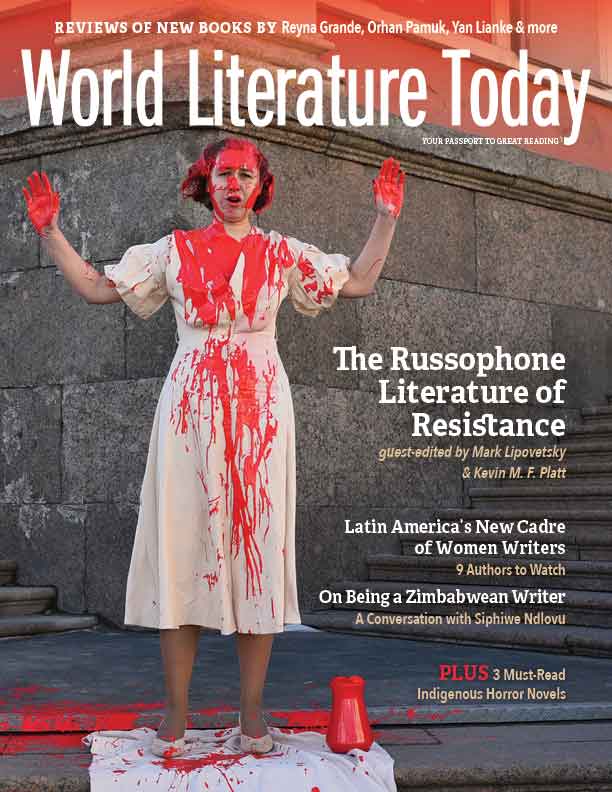Editor’s Note
Language itself turns into a minefield in which you can’t put your foot down anywhere without risk of an explosion.
– Maria Stepanova
 IN HER SEARING POEM “Monologue of a Russian Woman #4,” Maria Malinovskaya—who was born in Belarus, currently lives in Moscow, and writes in Russian—confesses her personal guilt over the 2022–2023 war on Ukraine: “can one under these circumstances / publish books / date, read poems / in russian? // probably yes but probably still / not all texts can be read // compassion is one thing / poetry is another // you can make a certain gesture / an antimilitaristic one // say that it shouldn’t be like this // that this is a war crime.” Even as she contemplates whether or not every Russian should feel collective guilt over the war crimes being committed by the Putin regime, she insists that each individual must reckon with their own allegiances and complicities, regardless of the national identity on one’s passport.
IN HER SEARING POEM “Monologue of a Russian Woman #4,” Maria Malinovskaya—who was born in Belarus, currently lives in Moscow, and writes in Russian—confesses her personal guilt over the 2022–2023 war on Ukraine: “can one under these circumstances / publish books / date, read poems / in russian? // probably yes but probably still / not all texts can be read // compassion is one thing / poetry is another // you can make a certain gesture / an antimilitaristic one // say that it shouldn’t be like this // that this is a war crime.” Even as she contemplates whether or not every Russian should feel collective guilt over the war crimes being committed by the Putin regime, she insists that each individual must reckon with their own allegiances and complicities, regardless of the national identity on one’s passport.
The writers included in this issue’s “Russophone Literature of Resistance” cover feature represent a broad swath of contemporary Russian-language cultural production, transcending the contested borders of the Russian Federation proper: they include poets, novelists, critics, essayists, translators, cinema critics, publishers, bookstore owners, academics, festival organizers, and cultural impresarios writing in Russian but often with multilingual vocabularies and transnational topoi in their poems and essays. They share Russian as their common language of creative expression, not only centered in the cultural metropolises of Moscow and St. Petersburg but from far-flung outposts of the post-Soviet (and neo-Soviet) empire—or from oppositional spaces beyond its borders.
Against what guest editors Mark Lipovetsky and Kevin M. F. Platt call “the imperial dictatorship of normative Russian,” these writers “respond with writing that stakes a claim to life on their own terms, to dignity, and to a language that is as much theirs as anyone else’s.” The guest editors’ curated texts are marked, in their words, by hybridity, deterritorialization, and micronarratives, collectively claiming a space for a “minor literature” that deserves a major global readership. In her marquee interview that opens the section, Maria Stepanova insists on the legitimacy of this “alternative ‘we,’” a we that is both “possible and necessary,” embodying a “form of resistance” that takes its stance from within the very language of the perpetrator.
And against a contemporary Russian political and social order predicated on a system of “violence, pure and simple,” Mikhail Shishkin invokes a “different Russia,” the Russia of Pushkin and Chekhov, of Tolstoy and Chagall, of Rachmaninov and Kharms, of Schnittke and Brodsky. The writers featured here may not (yet) have the name recognition of these legendary figures of the nineteenth and twentieth centuries, but they are already among the defining voices of the twenty-first.
Daniel Simon
